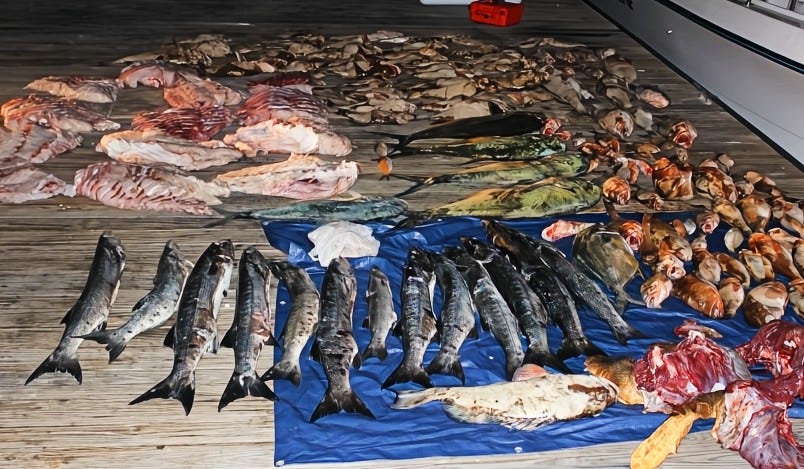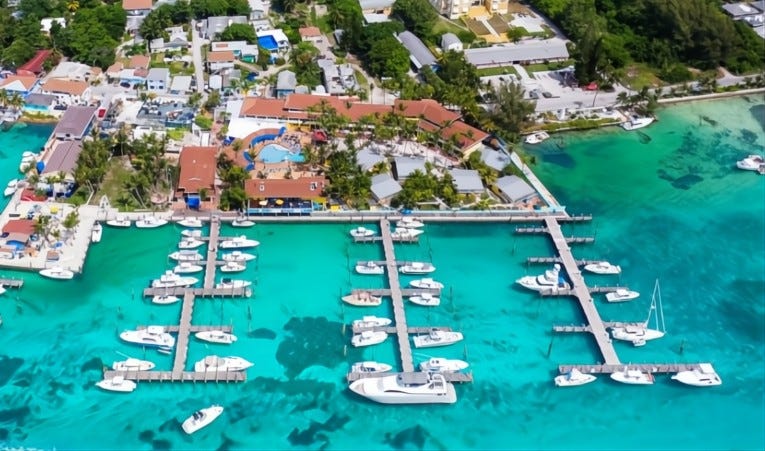Bahamas Bookings Are Way Down, And Other Random News
Click2Clear Website for Inbound Clearance Not Ready for July 4 Rush
Marina bookings in the Bahamas are down 80 percent this year from their normal highs, according to Peter Maury, president of the Association of Bahamas Marinas.
Speaking to a reporter for the Guardian newspaper yesterday, Maury said he blamed increases in fees for boats under a new law that went into effect today. “By this time of year we would have over 100 boats already booked all around the country, but now if we have 20 that’s a lot,” Maury was quoted as saying.
Also, Maury noted that even though effective today, the Click2Clear online payment system had not been updated to reflect the new fees. The American July 4 holiday is normally a busy time with a rush of recreational craft crossing over to the nearest ports of entry.
“We were on the phone with the customs department trying to understand how they will roll this out. There is no online portal for boats to pay even if they were booked. From what it looks like now, they will have to go and pay over the counter at the customs department or at the Department of Inland Revenue,” he said.
Meanwhile, the president of the U.S. National Marine Manufacturers Association warned Bahamas Prime Minister Philip Davis that the new fees “will have an immediate and adverse impact on boating tourism to the Bahamas, including canceled trips.”
“We are especially concerned that these changes were introduced without stakeholder input from the marine industry, tourism operators, and the international boating community,” NMMA President Frank Hugelmeyer said. “Sudden regulatory shifts risk undermining long-standing partnerships and could damage confidence in the Bahamas as a boater-friendly and welcoming destination. Guides, anglers and boaters will seek alternatives amidst uncertainty.”
Example in Stepped-Hull Story Going to Criminal Court
One of the fatalities cited in a recent Loose Cannon story about the dangers of stepped hulls in center consoles has resulted in criminal charges against the operator.
Reinaldo Aquit was charged with negligent homicide manslaughter and other lesser offenses in connection with a November 7 accident that killed Stephanie Rodriguez, 24.
The vessel was heading to Key West from Miami as part of a “poker run” when the vessel spun out in a starboard turn. Six of the eight people on board were ejected from the vessel, including Rodriguez. The boat was a Deep Impact Custom 39.
Aquit is to be arraigned on Thursday.
Fewest Fatalities in 50 Years
The U.S. Coast Guard today reported that 2024 had the fewest boating fatalities since the it began collecting statistics more than 50 years ago.
Fatalities fell 1.4 percent to 556 from 564 in 2023, while overall incidents increased by 1.1 percent from 3,844 to 3.887. Nonfatal injuries increased 2.1 percent from 2,126 to 2,170. Alcohol continued to be the leading known contributing factor in fatal boating accidents in 2024, accounting for 92 deaths, or 20 percent of total fatalities.
One segment did have an increase in deaths—standup paddleboards. Drowning accounted for three-quarters of deaths, with 87 percent of victims not wearing life jackets.
Property damage totaled $88 million.
Operator inattention, improper lookout, operator inexperience, machinery failure and navigation rules ranked as the top five primary contributing factors for accidents in general.

Boater Freedom Law Likely To Benefit Poachers
Followers of Florida’s Fish & Wildlife enforcement efforts are familiar with the sight. Officers had busted a poacher then arranged his ill-gotten gains for a photograph as both evidence and to publicize the arrest.
Like the new Bahamas fees, changes to policing as specified by Florida’s Boater Freedom legislation also went into effect today.
Under the new law, Florida cops are not permitted to pull over and board recreational vessels without probable cause to suspect a violation. In other words, officers will have to actually see a boater behaving unlawfully or have prior information that a crime was being committed.
That means no more random flare and lifejacket checks, not by Fish & Wildlife officers, not by Sheriffs’ marine patrols, not by municipal police. Only the U.S. Coast Guard would retain the right to board vessels in Florida waters without probable cause.
During the run-up to passage, there wasn’t much mention of how the end of random Fish & Wildlife boardings would hamper efforts to thwart poachers. Before today officers would board a vessel under the guise of a routine safety check, then take a look inside coolers to ensure any fish were both in season and compliant with bag limits.
This has conservationists like Matt DePaolis worried. DePaolis is environmental policy director fo rthe Sanibel-Captiva Conservation Foundation of Southwest Florida.
“It’s a real worrty that it will be much easier to away with poaching now, because it is very diffult to catch someone in the act,” DePaolis told the Tampa Bay Times yesterday. “Having the ability to go and do a quick check seemed like an important mechanism.







Gee, that's too bad. Reap what you sow.
Thanks for the updates on previous stories. Hopefully the pressure will have an effect on the Bahamas